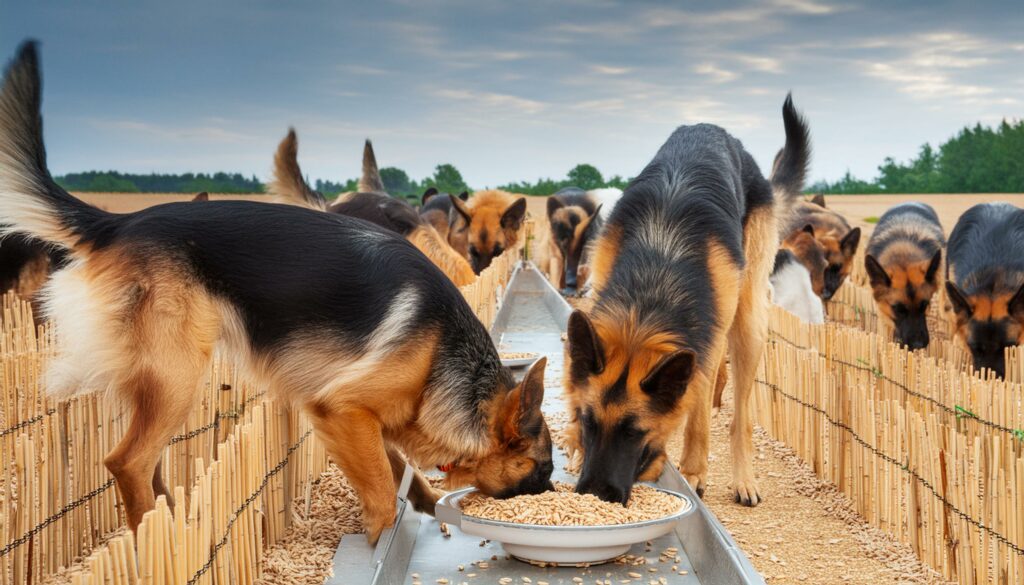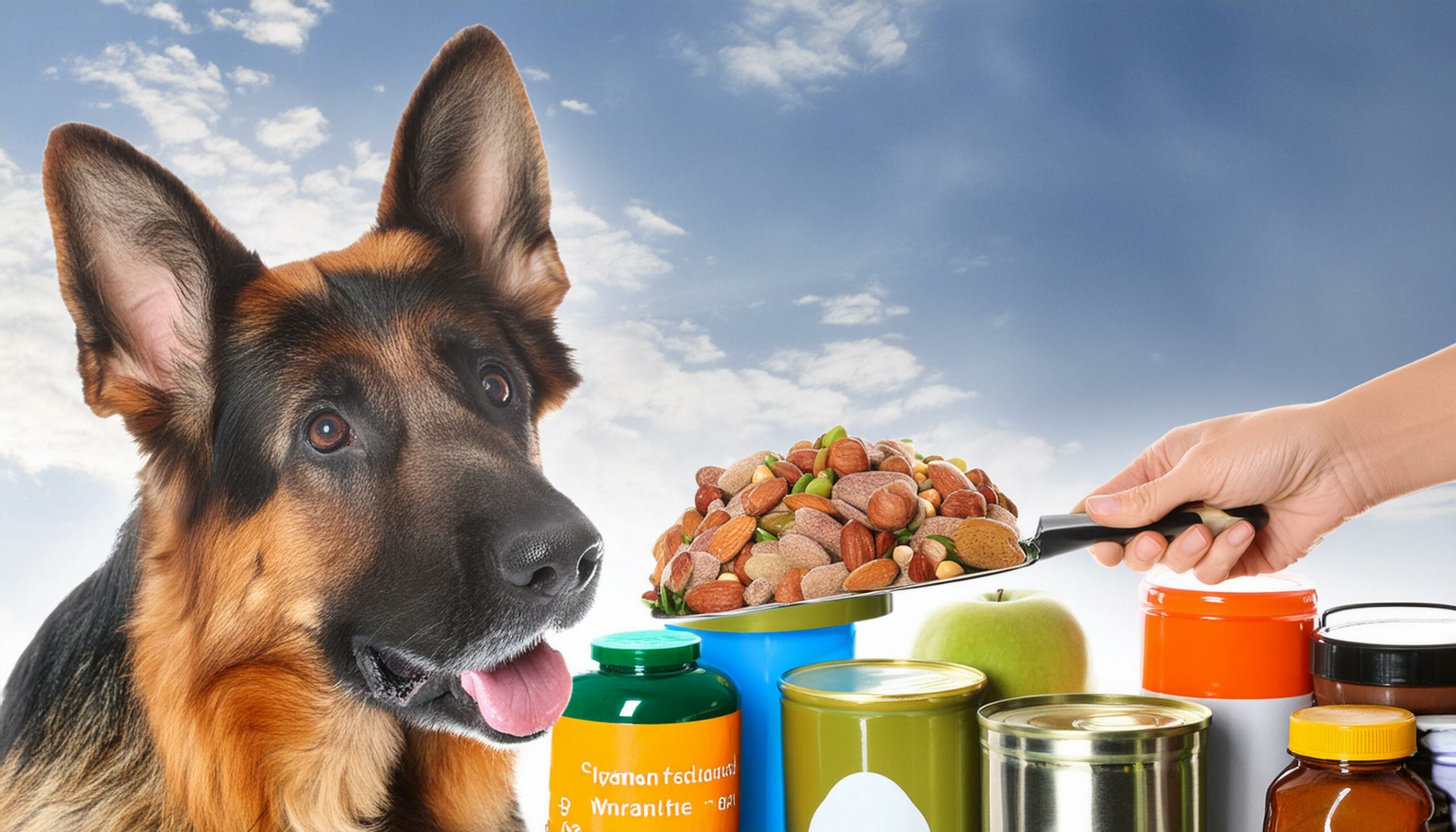German Shepherds are beloved family pets known for their intelligence, loyalty, and strength. As responsible pet owners, we often want to share our meals with them, but it’s essential to understand what human foods are safe and which ones should be avoided to ensure their health and well-being.
Understanding the Dietary Needs of German Shepherds
German Shepherds are active, energetic dogs with specific dietary requirements. They need a balanced diet that provides them with the right amount of protein, carbohydrates, fats, vitamins, and minerals to support their overall health and well-being. While high-quality commercial dog food is formulated to meet these needs, many pet owners wonder if it’s okay to supplement their dog’s diet with human food.
Human Foods Safe for German Shepherds
- Lean Meats: Lean cuts of cooked meat, such as chicken, turkey, and beef, can be a healthy addition to your German Shepherd’s diet. These meats are rich in protein, which is essential for muscle development and maintenance. However, it’s crucial to remove any bones and excess fat before serving, as they can pose a choking hazard or lead to digestive issues.
- Vegetables: Many vegetables are safe for German Shepherds and can provide essential vitamins and minerals. Carrots, green beans, and peas are excellent choices that can be served cooked or raw. These vegetables are low in calories and high in fiber, making them a healthy option for your furry friend.
- Fruits: Certain fruits, such as apples, bananas, and blueberries, can be offered as occasional treats. These fruits are packed with vitamins, antioxidants, and fiber, which can benefit your German Shepherd’s overall health. However, it’s essential to remove seeds and pits, as they can be harmful if ingested.
Human Foods Harmful to German Shepherds
- Chocolate: Chocolate contains theobromine, a compound that is toxic to dogs. Even small amounts of chocolate can cause symptoms ranging from vomiting and diarrhea to seizures and death. Dark chocolate and baking chocolate are particularly dangerous, so it’s crucial to keep all chocolate products out of your German Shepherd’s reach.
- Grapes and Raisins: Grapes and raisins can cause kidney failure in dogs, even in small amounts. The exact toxic substance in grapes and raisins is unknown, so it’s best to avoid feeding them to your German Shepherd altogether.
- Onions and Garlic: Onions and garlic contain compounds that can damage a dog’s red blood cells, leading to anemia. Whether raw, cooked, or powdered, these ingredients should be avoided in your German Shepherd’s diet. Common foods seasoned with onions and garlic include soups, stews, and sauces, so be sure to check ingredient labels carefully.
Guidelines for Feeding Human Food to German Shepherds

When offering human food to your German Shepherd, it’s essential to follow these guidelines to ensure their health and safety:
- Moderation is Key: Human food should only make up a small portion of your dog’s overall diet. The majority of their nutrition should come from high-quality commercial dog food that is formulated to meet their specific dietary needs.
- Watch for Allergies: Introduce new foods gradually and monitor your dog for any signs of allergies or digestive upset, such as itching, vomiting, or diarrhea. If your German Shepherd shows any adverse reactions to a particular food, discontinue feeding it immediately and consult your veterinarian.
- Avoid Certain Ingredients: Some common ingredients in human food can be toxic to dogs and should be avoided entirely. These include onions, garlic, chocolate, grapes, raisins, and foods containing the artificial sweetener xylitol. Before offering any human food to your German Shepherd, check to make sure it is safe for canine consumption.
Homemade Diet vs. Commercial Dog Food
While feeding your German Shepherd homemade meals can be tempting, it’s essential to consider the pros and cons carefully:
- Pros of Homemade Diet: Homemade diets allow you to have more control over the ingredients and quality of your dog’s food. You can tailor the diet to meet your German Shepherd’s specific needs and preferences, and it can be especially beneficial for dogs with food sensitivities or allergies.
- Cons of Homemade Diet: Creating a balanced homemade diet that meets all of your dog’s nutritional requirements can be challenging. Without proper guidance, your German Shepherd may miss out on essential vitamins and minerals, which could lead to nutritional deficiencies or other health problems.
- Consulting a Veterinarian: Before switching to a homemade diet or introducing new foods to your German Shepherd’s diet, it’s essential to consult with your veterinarian. They can provide personalized recommendations based on your dog’s age, weight, health status, and dietary needs. Your veterinarian can also help you create a balanced homemade diet or recommend high-quality commercial dog food brands that meet your German Shepherd’s nutritional requirements.
Conclusion
While it can be tempting to share your meals with your German Shepherd, it’s essential to be mindful of what foods are safe and which ones can be harmful. By following the guidelines outlined in this article and consulting with your veterinarian, you can ensure that your furry friend stays happy, healthy, and well-fed for years to come.
FAQs
Can I give my German Shepherd cooked chicken?
Yes, cooked chicken is safe for German Shepherds as long as it’s boneless and free from seasoning.
Is peanut butter safe for German Shepherds?
Yes, plain, unsalted peanut butter can be given to German Shepherds as an occasional treat. Just make sure it doesn’t contain xylitol, a harmful sweetener.
Are there any vegetables I should avoid feeding my German Shepherd?
While most vegetables are safe, avoid feeding your German Shepherd onions, garlic, and mushrooms.
Can German Shepherds eat rice?
Yes, plain, cooked rice can be a bland and easily digestible meal for German Shepherds, especially if they have an upset stomach.
How much human food can I give to my German Shepherd?
Human food should only make up about 10% of your dog’s total daily calorie intake. The majority of their diet should come from high-quality dog food.
